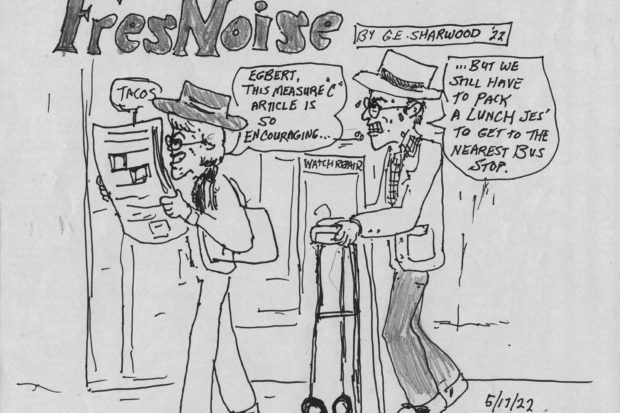
Sales tax renewal efforts in Fresno and Madera counties hit historic roadblocks in May and have no chance of success at the ballot this year. Running on 20th century plans for the future, the renewal committees for Measure C and Measure T have refused to engage with the community. Instead, they have tried to push through plans that prioritize road subsidies for leapfrog residential development and massive trucking warehouse zones over public transit and road repair.
In more than a year of staff-driven meetings, neither committee received a presentation on the transportation sector’s contribution to climate change or sought to define equity in transportation spending. Neither has discussed the need for electrification on a massive scale. Both counties have nearly identically structured expenditure plans; only the proposed percentages differ. Both expire in 2027.
In their latest offering, Fresno planners propose to cut transit spending in half, taking it from 24% of the current Measure C pie down to 12% for the next 30 years. Madera County proposes only 2% for transit—forever, no sunset clause. But all debate over the percentage splits appears to be academic—moot—in light of the overwhelming levels of organized opposition that have emerged on both sides of the river.
Last month saw ads placed in local papers, press conferences held and official letters submitted, all calling on transportation planning agencies to open up the process to the community and stop the rush onto the November 2022 ballot. This represented the fourth community letter of concern submitted about the poor public process since February 2021. Each time, the list grows longer.
For Fresno, a letter signed by 36 entities from every sector of society is an unprecedented show of strength. Madera’s 12 entities were equally significant in a county with just two incorporated cities and 156,000 residents compared to Fresno’s 15 cities and population of 990,000.
The reaction from Clovis Mayor Pro Tem Lynne Ashbeck, co-chair of the Measure C Renewal Executive Committee, was swift and harsh. She told Fresno Bee reporter Gregory Weaver in a May 17 article, “I don’t think (Leadership Counsel for Justice & Accountability and Building Healthy Communities) ever engaged in a constructive fashion to move anything forward except to tell us why it was wrong.”
Despite her apparent skill set as a $423,000 per year executive vice president as Valley Children’s Healthcare and Hospital’s community impact officer and long-serving Clovis City Council member, Ashbeck clearly was not up to the task and bears the greatest responsibility for the breakdown.
She argued against including advocates on the steering committee from February to November 2021, and as its chair she is biased, consistently silencing and pushing aside all calls for reform. The cost in people’s time and the more than $1 million in public money wasted on unreliable consultants would justify Ashbeck’s removal from future committee efforts.
Swinging to the bitter end, she further told the Bee she was opposed to the delay. “So I just think it would be two more years of what we have right now…I haven’t seen any real engagement or constructive help to this point,” she said of the community-based organizations, adding that the ad published in the Bee last month was not an “authentic kind of conflict resolution.” She said, “Do I think they would ever be satisfied? I don’t know.”
In Madera County, the people appear to have already spoken. Support for a 2022 ballot measure has dropped to 68% among likely voters, just two points above the two-thirds supermajority needed for approval, according to the committee’s latest survey.
Fresno committee members were not shown the complete results of their latest publicly funded survey, the second one to be kept secret, although their polling consultant tried in early May to convince them they were at 80% support. Madera posts their complete survey results online.
